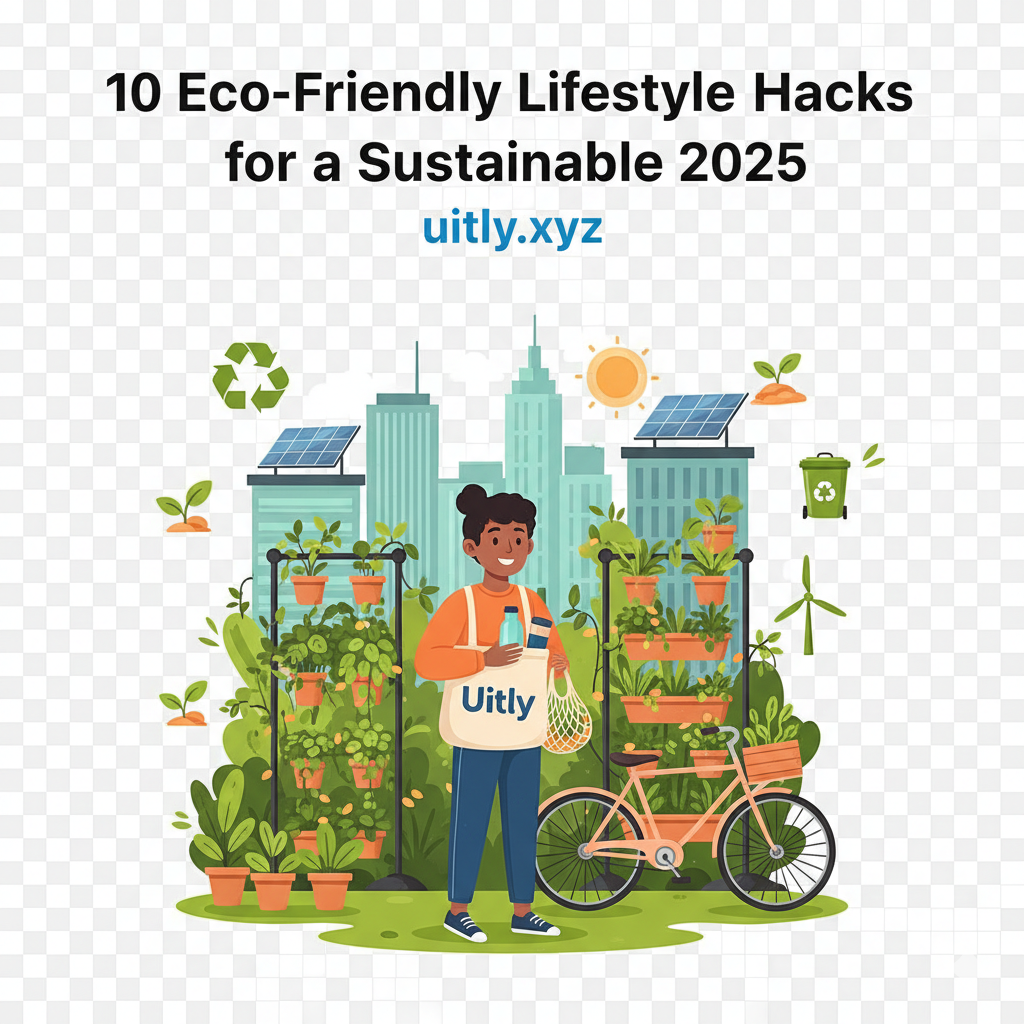Go Green with Uitly in 2025
Sustainability isn’t just a trend—it’s a way of life that’s more accessible than ever in 2025. From cutting waste to embracing renewable energy, eco-friendly habits can save money, boost your well-being, and help the planet thrive. Whether you’re a busy professional or a student, small changes can lead to big impacts. At Uitly.xyz, we’re committed to delivering practical lifestyle tips to inspire smarter living. Following our AI tools guide and introductory post, this blog dives into our Lifestyle category with 10 eco-friendly hacks to make 2025 your greenest year yet. Ready to reduce your carbon footprint? Let’s explore Uitly’s sustainable tips!
Why Sustainable Living Matters in 2025
The need for sustainability is urgent. A 2025 UN report projects that eco-friendly practices could reduce global emissions by 20% by 2030. Beyond environmental benefits, green living lowers utility bills, promotes healthier diets, and declutters your space. Uitly’s lifestyle blogs focus on actionable steps that fit any schedule. From swapping single-use plastics to optimizing home energy, these hacks align with 2025 trends like circular economies and net-zero goals. Want more lifestyle inspiration? Visit our Lifestyle Lounge.
10 Eco-Friendly Lifestyle Hacks for 2025
Here are Uitly’s top 10 sustainable hacks, with practical tips, costs, and benefits for beginners and eco-enthusiasts alike.
- Switch to Reusable Products
Say goodbye to single-use plastics with reusable alternatives like stainless steel water bottles, bamboo cutlery, and cloth bags. Brands like Hydro Flask and Bee’s Wrap are 2025 favorites.
Cost: $10-$30 for a starter kit.
Benefits: Cuts plastic waste by 90% annually (EPA data).
Uitly’s Tip: Carry a foldable tote for shopping—find stylish designs on Etsy.
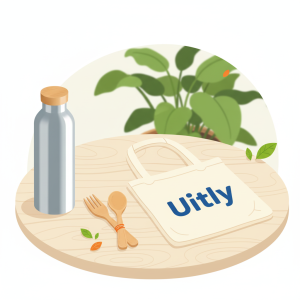
- Compost Kitchen Scraps
Turn food scraps into compost for gardens or plants. Compact composters like Lomi fit small spaces in 2025.
Cost: $50-$300 for a composter.
Benefits: Reduces landfill waste by 30%.
Uitly’s Tip: Start with a countertop bin—explore guides in our Learning Corner.
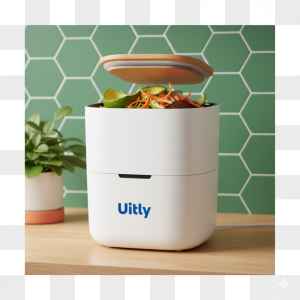
- Use Energy-Efficient Lighting
Replace incandescent bulbs with LED smart lights (e.g., Philips Hue). They use 75% less energy and last longer.
Cost: $10-$50 per bulb.
Benefits: Saves $100/year on electricity (Energy Star).
Uitly’s Tip: Pair with a smart hub for timers—see tech tips on our Tech Trends page.

- Shop Secondhand Fashion
Platforms like ThredUp and Vinted make thrifting trendy. Buy pre-loved clothes to cut textile waste.
Cost: $5-$50 per item, 70% cheaper than new.
Benefits: Reduces fashion’s carbon footprint by 25%.
Uitly’s Tip: Curate a capsule wardrobe with thrifted pieces for a unique style.

- Adopt a Plant-Based Meal Day
Try “Meatless Mondays” with plant-based recipes. Apps like HappyCow suggest vegan meals.
Cost: $5-$15/meal, often cheaper than meat.
Benefits: Lowers emissions by 1.5 tons/year (Oxford study).
Uitly’s Tip: Find recipes in our Health & Wellness section.

- Optimize Home Energy Use
Smart thermostats (e.g., Nest) regulate heating/cooling with AI-driven reports in 2025.
Cost: $100-$250 for a thermostat.
Benefits: Saves 10-15% on energy bills.
Uitly’s Tip: Set schedules to match your routine—pair with LEDs for savings.
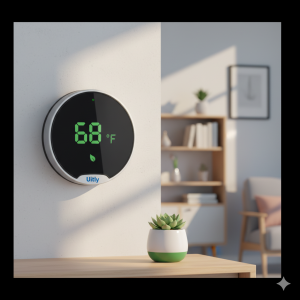
- Choose Eco-Friendly Cleaning Products
Brands like Seventh Generation offer biodegradable soaps. Refillable options are big in 2025.
Cost: $5-$20 per product.
Benefits: Reduces water pollution by 50%.
Uitly’s Tip: Make DIY cleaners with vinegar—find recipes in Uitly blogs.
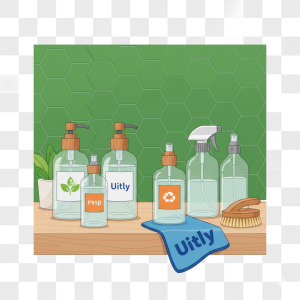
- Cycle or Walk Short Distances
Swap car trips for biking or walking for trips under 2 miles. E-bikes are a 2025 hit.
Cost: Free (walking); $500-$1,500 for an e-bike.
Benefits: Cuts transport emissions by 10%.
Uitly’s Tip: Map routes with Strava—share tips on our Community page.
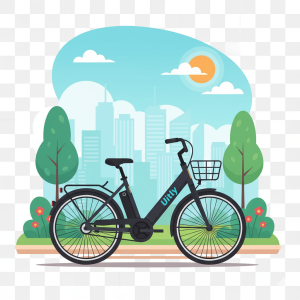
- Grow Your Own Herbs
Start a windowsill herb garden with basil or mint. Smart planters like Click & Grow simplify it.
Cost: $20-$100 for a kit.
Benefits: Saves $50/year on groceries.
Uitly’s Tip: Use herbs in plant-based recipes for a double eco-win.

- Support Local Farmers’ Markets
Buy seasonal produce from local markets to cut transport emissions. Apps like Farmstand help.
Cost: $10-$30/week, similar to supermarkets.
Benefits: Lowers food miles by 80%.
Uitly’s Tip: Plan meals with seasonal finds—see budgeting tips in our Finance section.

How to Start Your Eco Journey
Feeling inspired? Start with one hack, like reusable products, and add more over time. Use apps like JouleBug to track progress and make sustainability fun. Combine hacks—e.g., composting and herb gardening—for bigger impact. On a budget? Focus on low-cost options like thrifting or plant-based meals. Explore more green ideas on our Lifestyle Lounge or subscribe via the sidebar for weekly tips.
Join the Uitly Community: Share Your Green Hacks
Which hack are you trying first? Drop your thoughts in the comments! If you’ve got a sustainability tip, pitch it on our Contact page. Follow @UitlyXYZ on X for daily eco-hacks and updates. Let’s make 2025 greener together!
Conclusion: A Greener 2025 with Uitly
These 10 eco-friendly hacks show that sustainable living is achievable and rewarding. At Uitly.xyz, we’re here to guide you with practical lifestyle tips. Stay tuned for our next post on study hacks in our Learning Corner. Start one hack today, and let’s build a sustainable future!

